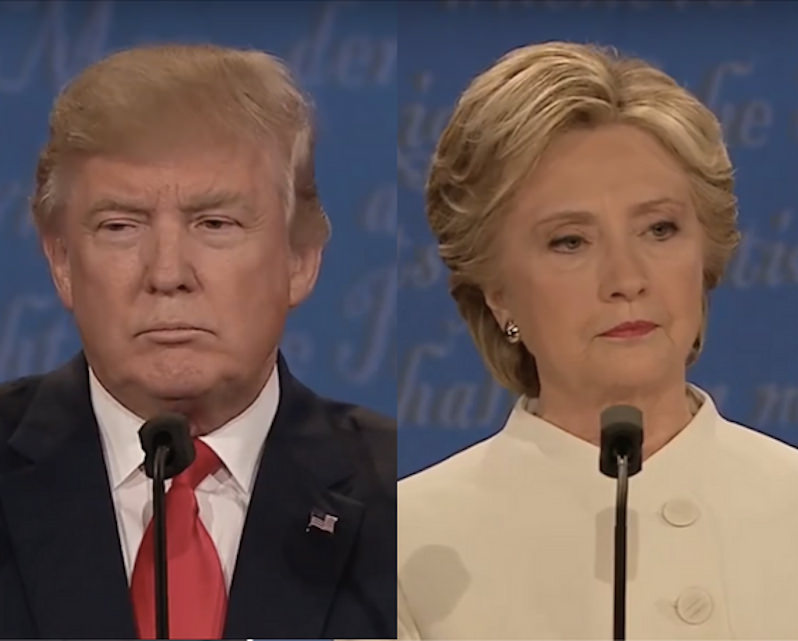Cast Your Vote: Whose Foreign Policy Position Do You Prefer?
As the presidential race tightens, we turn to our readers to help decipher a key aspect of Election 2016: foreign policy.
Donald Trump and Hillary Clinton argued over foreign policy during the third presidential debate. (Screen shot via YouTube)
We are only 10 days away from Election Day, and the two mainstream candidates are steamrolling through the swing states in an effort to court votes. Over the past week, WikiLeaks provided some revelations on how Clinton and her husband used the Clinton Foundation to their advantage. Donald Trump, meanwhile, continued to close in on Clinton in the polls.
The week began on a somber note, when news broke that longtime peace activist and California legislator Tom Hayden died at age 76. His original Truthdig reports, which have been reposted throughout the week, reinforce the importance of an anti-war foreign policy. “Our systems—politics, media, culture—are totally out of balance today because of our collective refusal to admit that the Vietnam War was wrong and that the peace movement was right,” he said in 2016.
Many of his reports written back in 2006 focus on American foreign policy in the Middle East. Although written over a decade ago, Hayden’s words of caution still ring true, as in this piece on a potential U.S. withdrawal from Iraq:
Many activists are learning for the first time, or perhaps all over again, what it means to be winter soldiers in a long war. All the wasted lives can never be brought back, all those squandered tax dollars will never be redistributed, true enough. But if the war itself was never going to be a cakewalk, why should ending it be any different? It may still be far from over, with the simmering question of Iran on the immediate horizon.
As Hayden warned, U.S. involvement in the Middle East is far from over, and throughout this election season a new player has entered the arena: Russia.
Earlier this week, Trump stated that Clinton, if elected, would cause World War III with Russia. Truthdig contributor Juan Cole argued that “[s]uperpowers don’t fight one another in the nuclear age … [they] fight proxy wars like Vietnam and Afghanistan.” Cole asserts that Clinton’s experience as secretary of state will make it easy for her to communicate with the Russian government and the Pentagon alike.
Others, however, don’t feel too positive about a potential Clinton administration’s foreign policy. Clinton has proposed a “no-fly” zone over Syria as part of her foreign policy plan, alarming security experts.
As Lauren McCauley writes, reports also surfaced this week showing how a Clinton administration “will likely usher in a more aggressive, bipartisan foreign policy in the Middle East and beyond.” She quotes Washington Post White House correspondent Greg Jaffe as writing, “The Republicans and Democrats who make up the foreign policy elite are laying the groundwork for a more assertive American foreign policy via a flurry of reports shaped by officials who are likely to play senior roles in a potential Clinton White House.” McCauley goes on to say, “One such study, published Wednesday by the Center for American Progress (CAP)—which is run by president Neera Tanden, policy director for Clinton’s presidential campaign—recommends the next administration step up its ‘military engagement’ amid a more ‘proactive and long-term approach to the Middle East.’ “
But what of Trump’s foreign policy? Juan Cole also argued earlier this week that when it comes to Trump’s assertions on the U.S. presence in the Middle East, “he doesn’t have the slightest idea of what he is talking about.”
Truthdig’s own Bill Boyarsky expressed a similar concern in his column this week, labeling Trump “a threat to democracy.”
“Trump’s scorn for the electoral system and democratic institutions is reason enough to fear a Trump presidency,” Boyarsky writes. “Added to that is his racist rabble-rousing against Muslims, those of Mexican descent and other immigrants.”
And of course, the discussion on foreign policy doesn’t solely revolve around just two presidential nominees. This week, NATO urged “all allies to deploy more troops and military equipment to Russia’s borders” in a move that Common Dreams staff writer Nika Knight called “shortsighted.”
There is also an inherent problem with the American military spending, says William D. Hartung, director of the Arms and Security Project at the Center for International Policy. “Through good times and bad, regardless of what’s actually happening in the world, one thing is certain: in the long run, the Pentagon budget won’t go down,” he writes. “As long as fear, greed, and hubris are the dominant factors driving Pentagon spending, no matter who is in the White House, substantial and enduring budget reductions are essentially inconceivable.”
So although there are broader, deeply embedded institutional factors responsible for American foreign policy, whoever wins on Nov. 8 will certainly make an impact. Given the events of the past week—the focus on increased tensions with Russia, and the tightening race between Clinton and Trump—we turn to you, our readers. Which candidate has a foreign policy position worth pursuing? Will Clinton’s experience, although “war hawkish,” serve in her favor, or will Trump’s business acumen serve him better as commander in chief?
Let us know in the poll below. One vote per person, please. (Make your selection and then click on “Vote.” To see results of the polling, click on “Results.”)
Independent journalism is under threat and overshadowed by heavily funded mainstream media.
You can help level the playing field. Become a member.
Your tax-deductible contribution keeps us digging beneath the headlines to give you thought-provoking, investigative reporting and analysis that unearths what's really happening- without compromise.
Give today to support our courageous, independent journalists.






You need to be a supporter to comment.
There are currently no responses to this article.
Be the first to respond.